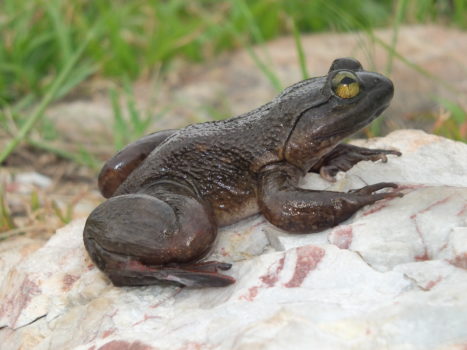
Ghana Environment News-Ghana has legally established a protected area for endangered frog species in the country.
Though there are a few protected areas for all manner of species, this is the first one for frogs in Ghana and many other parts of Africa.
The area comprises 847 acres of land located in the Ho West District of the Volta region.
This event is great news for environmentalists worldwide especially Herp-Ghana who have worked hard in collaboration with a few other organizations to see this through.
Founder and Director of Herp-Ghana; Dr. Caleb Ofori Boateng explains that this conserved area (located between Amedzofe and Gbadzeme), will be a safe haven for several endangered species including the Evolutionary Distinct and Globally Endangered Togo slippery frog (Conraua derooi), which is endemic to this new protected area and few adjoining areas.
“Other endangered species that will be protected by the reserved area include the Ukami Reed Frog, the Critically Endangered Hooded Vulture, the Vulnerable Black-bellied and White-bellied Pangolins and a plethora of endemic butterfly and amphibian species all of which already reside within this forested habitat and will now be protected by this new protected area”, Dr. Ofori Boateng explained.
He adds that “the Onepone Endangered Species Refuge, will safeguard some of the last remnant forest habitats situated within the Dahomey Gap-a savannah corridor that separates the Upper and Lower Guinea forests in West Africa”.
A statement issued by Herp-Ghana explained that the establishment of this protected area became necessary “because of an increasing pressure on this unique forest due to rapidly expanding human settlements, logging, slash and burn agriculture and a ferocious “bushmeat” hunting business”.
Herp Conservation Ghana, a local conservation NGO worked closely with its international partner Rainforest Trust and other funders (IUCN-PPI, Prince Bernard Nature Fund, Fondation Ensemble) to establish this new protected area in Ghana’s Togo-Volta Hills.
The Founder and Director of Herp-Ghana extended his gratitude to all who have helped them reach this feat.
He mentioned “The Future for Nature Foundation, the ZSL EDGE Fellowship Program, Conservation Leadership Program, the New England Biolabs Foundation, the Van Tienhoven Foundation, the Zoos Victoria, the Mohammed Bin Zayed Species Conservation Fund and the Rufford Small Grants Foundation” as entities that have supported them greatly.
He also extended his appreciation to the Interdisciplinary Center for Conservation Science (ICCS) at The University of Oxford, the Ho West District Assembly, The Ghana Wildlife Division and the Chiefs and people of Amedzofe and Gbadzeme for their immense contribution to the success attained.
What do you think about this piece? Share your comment in the comment thread and share the story using the social media buttons above. Thank you.